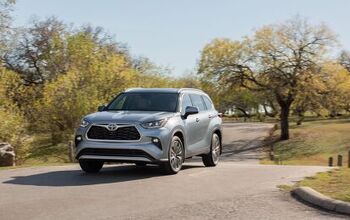Despite Automaker Profits, It Was Another Rough Year for Suppliers

When the pandemic convinced practically every industry to press pause in 2020, supply chains became so crippled that just getting sectors of commerce rebooted became a challenge in itself. It was the business equivalent of a twenty-car pileup, with the automotive industry being hit particularly hard due to the complexity of its own supply lines. While the following year represented an improvement, production failed to stabilize to pre-pandemic levels.
The solution for automakers and dealerships was to begin demanding more money for cars. With vehicles in short supply, the value of new and used models blew through the roof. This move kept automakers largely in the black for 2021, despite a general inability (or unwillingness) to manufacture products at the normal pace. However, it didn’t help suppliers, who are haven’t been able to tack on the same premiums to individual components while still having to cope with rising economic hurdles.
As carmakers started cutting production targets, suppliers found themselves having to cut their own output and contend with irregular orders from their many clients. This allowed bottlenecks to persist before new economic pressures manifested. Equipment manufacturers now find themselves in a situation where order consistency is nonexistent, material costs and shipping rates have risen, and labor shortages have become the norm.
The Wall Street Journal featured several auto part suppliers in a recent article, focusing on the ways they’ve attempted to navigate the current economic situation. Many companies have lowered the bar for prospective employees, with more than a few filling out their ranks with former criminals despite previously having barred them. But there are been other businesses taking heat for doing the same with current inmates, with some being accused of engaging in forced labor ( not that those accusations are anything new for this industry). Meanwhile, those who are playing by established rules are often finding themselves just scraping by.
From WSJ:
Some auto-parts makers say the outlook is almost as gloomy as it was in 2008 and 2009, when sales collapsed due to the recession.
“How are suppliers going to offset these cost increases we’ve experienced without getting price relief from [the car companies]?” [Peter] Anthony said. [The Chicago-based insulation supplier] UGN is losing money and recently began discussions with his customers about revising terms.
The biggest rub, however, is his company is losing out on the auto industry’s frothy pricing, he added. With tight inventories, car buyers are paying record sums for new vehicles, and that has led both auto makers and dealerships to post healthy earnings this year, despite disruptions caused by the computer-chip shortage.
Mr. Anthony’s firm is one link in a global supply chain that is buckling under the pressure of labor shortages, rising freight and commodity costs, and manufacturing disruptions.
Suppliers typically do business with the car companies under fixed contracts that set prices for the length of a vehicle program — which can run longer than five years — and are difficult to renegotiate, executives and industry attorneys say. Auto-parts makers also rely on a steady flow of work orders and efficient, just-in-time supply chains to contain costs.
But delivery delays and canceled orders resulting from the chip shortage, combined with soaring costs across their businesses, are putting even more pressure on already-thin profit margins, executives and industry analysts say.
Suppliers are getting sick of taking the hit for automakers who are broadening their profit margins by making vehicles cost more. Many are beginning to demand contract renegotiations with formal guarantees purchasing promises will be kept. Others are simply raising their own prices to account for the general hardship of the time. For example, the Michigan-based Cooper Standard Automotive has opted to ask customers for price increases totaling roughly $100 million. But other businesses don’t know if they’ll get sufficient business to negotiate higher prices, leaving many suppliers to simply cut projections through 2022.
Electrification has played an additional role in stoking the current industry mayhem. With automakers pivoting toward electric cars, certain suppliers are finding themselves losing relevance while others are becoming essential. Assembly plants are already canceling orders on short notice, often resulting in weeks of downtime. For suppliers specializing in parts necessary for combustion vehicles, that trend may last forever as more EVs populate the roadways.
“Electrification itself is turning the industry on its ear, and then you pile on top of that this traffic jam of issues,” said Mary Buchzeiger, chief executive officer of Lucerne International, a Detroit-area supplier of stamped metal parts. “We had an easier time in 2008.”
It’s probably in automakers’ best interest to help suppliers where they can, as there’s a limit to how much consumers will endure. Marques cannot continue scaling back production indefinitely until every new vehicle retails for cool million. And suppliers likewise cannot be expected to fly by the seat of their pants forever when the whole industry was dependent upon reliable delivery schedules less than two years ago. But automakers don’t appear to be in any rush to rejigger any existing agreements. While we’re inclined to believe that’s because suppliers are getting the shorter end of the stick, with profit reports seemingly backing that up, nobody can say for sure due to the clandestine nature of most business contracts.
General Motors President Mark Reuss said the company’s overall willingness to renegotiate depends on the contract length among other factors, but that the general preference is to stick to prior agreements.
“I would say passing things through is not the way to create value for our customers,” he stated during the Barclays virtual investor conference.
But customers have already been paying more for less. Intentional or not, automakers have already passed on expenses to their customers while leaving equipment manufacturers on the hook for deals they’re no longer adhering to. The bottom line is that suppliers have become well aware that the big dogs are turning juicy profits despite cutting output and they’re incapable of doing the same without similarly upping their own rates. Unfortunately, that scenario would undoubtedly encourage the car companies to continue raising their own prices until the public decides automotive pricing has become untenable and stops buying — opening the door to an entirely new subset of problems.
[Image: Chamil/Shutterstock]

A staunch consumer advocate tracking industry trends and regulation. Before joining TTAC, Matt spent a decade working for marketing and research firms based in NYC. Clients included several of the world’s largest automakers, global tire brands, and aftermarket part suppliers. Dissatisfied with the corporate world and resentful of having to wear suits everyday, he pivoted to writing about cars. Since then, that man has become an ardent supporter of the right-to-repair movement, been interviewed on the auto industry by national radio broadcasts, driven more rental cars than anyone ever should, participated in amateur rallying events, and received the requisite minimum training as sanctioned by the SCCA. Handy with a wrench, Matt grew up surrounded by Detroit auto workers and managed to get a pizza delivery job before he was legally eligible. He later found himself driving box trucks through Manhattan, guaranteeing future sympathy for actual truckers. He continues to conduct research pertaining to the automotive sector as an independent contractor and has since moved back to his native Michigan, closer to where the cars are born. A contrarian, Matt claims to prefer understeer — stating that front and all-wheel drive vehicles cater best to his driving style.
More by Matt Posky
Latest Car Reviews
Read moreLatest Product Reviews
Read moreRecent Comments
- Calrson Fan Jeff - Agree with what you said. I think currently an EV pick-up could work in a commercial/fleet application. As someone on this site stated, w/current tech. battery vehicles just do not scale well. EBFlex - No one wanted to hate the Cyber Truck more than me but I can't ignore all the new technology and innovative thinking that went into it. There is a lot I like about it. GM, Ford & Ram should incorporate some it's design cues into their ICE trucks.
- Michael S6 Very confusing if the move is permanent or temporary.
- Jrhurren Worked in Detroit 18 years, live 20 minutes away. Ren Cen is a gem, but a very terrible design inside. I’m surprised GM stuck it out as long as they did there.
- Carson D I thought that this was going to be a comparison of BFGoodrich's different truck tires.
- Tassos Jong-iL North Korea is saving pokemon cards and amibos to buy GM in 10 years, we hope.


































Comments
Join the conversation
New car sales have been in decline years before covid 19 and with more automakers coming on line all the time, they're losing market share too. In other news, the auto aftermarket has been growing exponentially in the same frame time. Extended easy financing is supposed to fight this. Parts suppliers can just change teams, supply the aftermarket, reproduction/resto parts, etc. Or play both sides if they're not already doing it.
DenverMike I thought the same as people are keeping their vehicles longer the aftermarket for parts is growing. I cannot see the aftermarket declining anytime soon and if anything continued growth for the near future.